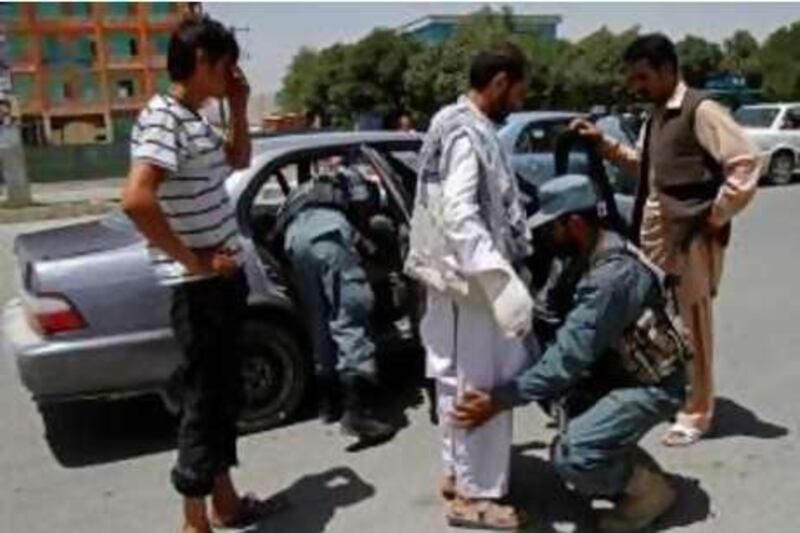KABUL // If Ajmal Samadi had five minutes to address the international dignitaries attending a high-profile conference in the Afghan capital today, his words would be blunt and to the point. "My message would be shame on you because nine years after the Taliban you are coming to Kabul to celebrate the second most corrupt government on earth and you have blocked the entire city," the civil-society activist said.
"Do you think this is how a state can be built, democracy can flourish? Is this the way you liberated Afghanistan from the Taliban?" UN secretary general Ban Ki-moon, the US secretary of state, Hillary Clinton and the British foreign minister, William Hague, will be among those attending today's meeting. Although government reform and the control of donor money will be two of the main subjects on the agenda, security will be inevitably the overriding issue for visiting dignitaries and the wider public.
Kabul is in lockdown, with checkpoints lining the streets and traffic blocked off entirely from some main roads. Civilian flights were also grounded from last night. For Mr Samadi, the tense atmosphere that has been building up all week is symptomatic of the wider problems plaguing the country. As director of Afghanistan Rights Monitor, he recently published a report that revealed at least 1,074 civilians were killed in the conflict during the first six months of 2010.
He now believes it would "take a miracle" to win the war under the leadership of President Hamid Karzai. Even the best case scenario for the region in the years ahead is, he fears, likely to be extremely grim, with growing "social anarchism" in this country and insecurity spreading through neighbouring Pakistan and Iran. This is not a message that will be probably heard at the conference, where the UN, the US and its allies hope to demonstrate that the Afghan government is moving closer to taking control of its own destiny.
Policy measures that are to be announced include the clear timetable for the withdrawal of foreign troops by the end of 2014. However, today's summit is just the latest in a series of major international meetings on Afghanistan that have been held since the 2001 invasion that ousted the Taliban regime. Others were regarded by many here as disappointments, with people often complaining they promised much and delivered little.
And despite the tight security in place, there is still the nagging feeling that the insurgents could find a way through the security maze and manage to launch an attack, just as they did at a peace jirga in June. Already this week there has been one suicide bombing inside the city that left at least three people dead and dozens wounded. "In the middle of all this, who is winning here? It's the Taliban, the insurgency. Increasingly we see their influence growing across the country," said Mr Samadi.
A reintegration programme for militants and the prospect of talks with rebels are among the topics that are expected to be discussed at the conference at some level. Mr Samadi described the idea of negotiations as meaningless because "it's a one-sided process" that the Taliban have shown no interest in. Yet for other Afghans, dialogue with the rebels and even large concessions to their demands are required for any chance of peace.
Mawlawi Ataullah Ludin is an MP and member of the political wing of Hizb-e-Islami - a party with a militant breakaway faction that is now fighting the government and foreign troops. Warning that "all over the country the security situation is getting worse very fast", Mr Ludin said the constitution should be changed according to the Taliban's wishes and backed the idea of a timetable for the withdrawal of foreign forces. Ultimately, he added, senior rebel leaders including Mullah Mohammed Omar and Gulbuddin Hekmatyar should be allowed roles in the political process.
"This will happen. If it does not, Nato and the international community will be defeated here and drop to the land on their knees like the Russians," he said. Human Rights Watch has criticised both the government in Kabul and its foreign allies of ignoring the concerns of women when attempting to reintegrate fighters and potentially strike a deal with the Taliban. Meanwhile, Weeda Ahmad, director of the Social Association of Afghan Justice Seekers, said those responsible for the bloodshed that dominates the country's recent history must be held to account before there can be peace.
"From the communist coup up until now, all the criminals should be forced to leave power and drop their weapons," she said. @Email:csands@thenational.ae





